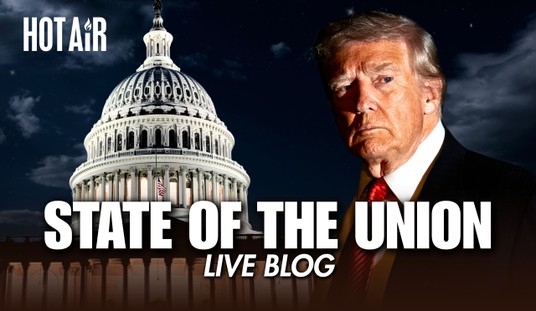How can people measure the status of an election cycle? Direct polling, for all its imperfections and range-of-competence issues, provides the most specific race-by-race looks. Voter registration figures can tell a broader story about organization and enthusiasm, however, and so far it looks like Republicans are still winning that battle — especially in states that matter, as the Associated Press reports today (via Gary Gross):
Republicans have gained ground on Democrats in registering voters in three battleground states and kept their razor-thin advantage in Iowa – encouraging news for Donald Trump eight weeks before Election Day.
Republicans added hundreds of thousands of voters to the rolls since 2012 in states including Florida and Arizona, and narrowed the gap in North Carolina, according to data compiled by The Associated Press. In Iowa, Republicans prevented Democrats from surpassing them, aided by a court ruling upholding a ban on voting by ex-felons, who often register as Democrats.
Hope Yen warns that this might not translate directly into a measure of Donald Trump’s success:
The latest registration numbers aren’t an assurance of new voters for Trump. Some changes reflect those who have died and been removed from the list, while others are inactive, not having voted in recent elections. In Florida, newly registered Hispanics are turning against the Republican nominee, stung by his anti-immigrant rhetoric. And Democrats historically have done well in signing up new voters in the final stretch.
Maybe not, but it does tend to show that attempts at shaming voters from being in the same party as Trump haven’t been effective. It also demonstrates the effectiveness of the Republican ground game, if not necessarily Team Trump’s. Two years ago, the RNC vastly expanded the Republican Leadership Initiative (RLI) and began hiring thousands of workers in key battlegrounds in order to improve their peer-to-peer politicking.
I wrote about the RLI, and the mixed-but-positive feedback from the ground, in Going Red:
The RLI “hire[s] people from the communities that we want to influence, from the community to stay in the community, to then meet metrics that we set,” he explains. “That means one-on-one meetings for that community, and that means not just necessarily sitting around talking about fracking and clean coal; it means having a pizza party, bringing a band in, once in a while giving hot dogs out and talking to people, and then going to community events.” …
Priebus wants to lift that burden from the candidate by building a turnkey operation that can coordinate with the eventual nominee, no matter who he or she is. “The fact is,” Priebus says, “when you’ve got sixteen candidates, they’re raising money to win a nomination fight in Iowa, New Hampshire, and South Carolina. They are not necessarily worried about how many voter registrations we’re picking up in Florida, Ohio, or Nevada. That’s our problem.”
Of course, the candidate would have to decide whether to use this RNC turnkey organization, but as Priebus says, they would have to be crazy to pass it up. “We sit down with the nominee and say, here you go. We’ve not only got our finances straight, we’ve got the $26 million waiting in the presidential trust for you,” Priebus says. “We’ve got this field operation with this many thousands or however many the amount of people. We got a data operation that is something that we can be proud of. We’ve got our act together when it comes to our digital operation as well. That’s what a competent national party needs to be able to do.”
Reprinted (or Adapted) from GOING RED: THE TWO MILLION VOTERS WHO WILL ELECT THE NEXT PRESIDENT—AND HOW CONSERVATIVES CAN WIN THEM Copyright © 2016 by Ed Morrissey, published by Crown Forum, an imprint of Penguin Random House LLC.
That organization will have a broader focus than the presidential election, in part because Team Trump isn’t orienting their efforts to this kind of peer-to-peer politicking. Yen’s correct about not drawing a conclusion about a direct impact on the presidential race from these figures. On the other hand, it shows that neither the DNC or Team Hillary is doing very well at the ground game either, despite more resources and a supposedly sharper focus on it.
How does this registration effort look from the perspective of battleground territory? Salena Zito reports from western Pennsylvania, where very few people seem put off by being declared “deplorable” by Hillary Clinton, and it’s not just the RLI that’s converting voters into Republicans:
She was among more than 60 employees who attended an informal voter-registration effort conducted by Secure Energy for America, a non-partisan trade association that has visited energy vendors and suppliers in key counties of Southwestern Pennsylvania, Ohio’s Mahoning Valley, and Virginia. It hopes to mobilize energy-industry workers, along with their relatives and neighbors, to vote in November. Officially, the effort is non-partisan. Yet for most energy workers in Pennsylvania, voting to preserve their industry means voting for Trump and Toomey.
The registration drive gets to the heart of the election in Western Pennsylvania. Democrats in these small communities want to hold on to their way of life; they feel their communities have as much value as those of their more-cosmopolitan Democratic cousins, and they cannot reconcile themselves to a national Democratic Party that they feel is working against them. They are the voters whose simple motivation to vote outside of the party they were born into has fallen under the radar of the national press and the polls.
But the energy industry has noticed. “This kind of endeavor is terrifically impactful with voters,” said Ron Sicchitano, the Democratic Party’s chairman here in Washington County. “I’ve got to hand it to them.” Sicchitano, a coal miner, says anti-coal statements by President Barack Obama and presidential candidate Hillary Clinton have had a “tremendously devastating” impact on voters in a county that has been reliably Democratic in the past.
Zito thinks Democrats will be in for an unpleasant surprise on Election Night. We’ll see, but with the registration figures we’re seeing and polling in battleground states, it’s getting more and more possible that Democrats will blow the only opportunity they will have for a decade to seize control of the Senate, at the very least.









Join the conversation as a VIP Member